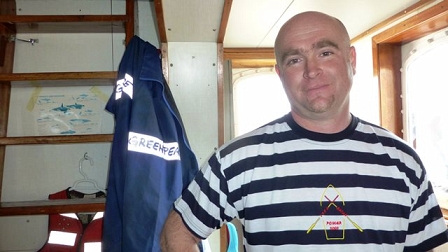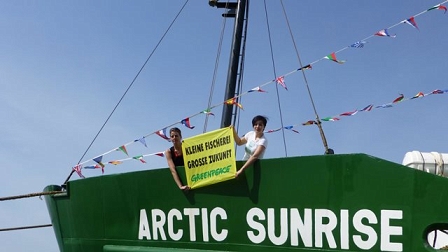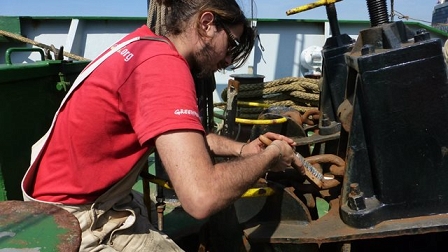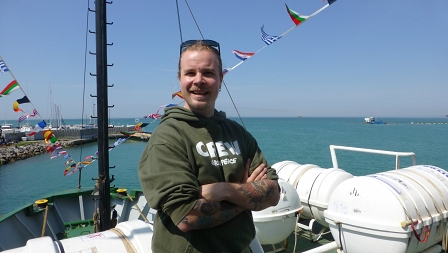Erstellt am: 3. 5. 2013 - 18:44 Uhr
Giving The Sea A Chance
This Saturday's Reality Check Special
Christian Zovic, the shaven-headed captain of a small Croatian fishing boat, gazes out at the sparkling Adriatic Sea in which he plies his increasingly precarious trade. "Right now in our world, the power of money rules," he says, "but our power lies in our numbers. We are many and if we unite we can change things for the better."

chris cummins
That’s why Zovic has briefly joined the crew of the veteran Greenpeace ship, the Artic Sunrise, which is on a campaign cruise calling in at the various ports of the European Union. The aim is to bring fishermen from the member states together and organize meetings with European politicians and journalists. Zovic joined the green and white campaign ship in the Croatian port of Rijeka before taking a short chug around to Koper in neighbouring Slovenia where it is anchored where I clamber on board.
The fisheries industry in Europe is in a dismal state in both an ecological an economic sense. Every year, far more fish are taken out of the sea annually than nature can reproduce. Estimates suggest that 75% of Europe’s stocks are overfished. And yet unemployment is rife. Greenpeace believes this is due to an unfair imbalance of power that is benefiting big business at the expense of coastal communities.

chris cummins
The NGO's fisheries expert Nina Thullen estimates that small-scale fishermen like Zovic, whose boats are less than 12 meters in length, make up about 80% of the European fishing sector. She argues that by using low-impact techniques, this majority tends to cause relatively little environmental harm. If only they held sway, Greenpeace believes, the seas could regenerate and feed Europe for generations to come.
Yet the small-scale fishermen complain that they are being squeezed out of business by the other 20% of the European fleet, the huge industrial trawlers. These "factory boats" can be up to 140 meters long with nets that Thullen describes as big enough to fit 13 jumbo jets inside." They have the capacity to sweep up 250 tons of fish a day in nets.
Marine biologists have been telling the European authorities that such gigantic capacity is not sustainable. Yet, according to Greenpeace, the large destructive trawlers are given preferential treatment by the current European quota system – which they say already ignores scientific advice. The large scale fleets own the rights to 80% of the stocks, which leaves the small-scale fishermen to fight over the scraps. The result: dwindling catches for the entire region, dwindling returns for the majority and a slow death for coastal communities.
chris cummins
Greenpeace says that this is a monster of Europe's own creation and it is advocating a drastic rewriting the EU Common Fisheries Policy which is up for its 10 year review this year. And that's why Greenpeace has organized this campaign in support of small-scale-fishermen. It's an alliance with business that some might find surprising: "Greenpeace is not anti-fishing in any manner," insists Thullen. "It's quite the opposite, we believe that the sea can only survive in co-operation with the people using it."
She argues that current policy destroys both the biodiversity below the waves as well as livelihoods of the small-scale fishermen who toil above them: "We're facing a huge employment crisis in Europe at the moment and the reality is that small scale fishermen along Europe's coastline are creating a great deal more employment per ton of fish caught than the industrial trawlers."

chris cummins
Thullen argues that the small-scale fishing fleet, as opposed to the self-sufficient factory ships, generates further on-shore jobs in terms of processing and selling the fish and are "integral to the social, economic and cultural fabric of coastal communities."
Fisherman Christian Zovic waxes lyrical about the romanticism of his traditional way of life "To be a fisherman means to be at one with nature. It means to love nature and to love the sea," he says. "It's a way of life. It's in my blood." Greenpeace hopes its current campaign will strengthen his voice and save his way of life from possible extinction. "We're trying to help them build a European movement and ultimately a European association of low impact fishermen," says Thullen.
So the rewriting of the CFP this year is a vital battleground for this new alliance. There could be plenty more fish in the sea, says Thullen, but only if we give them time to breed and flourish.
chris cummins
Thullen says that up until now fishermen like Zovic, who could live in symbiosis with nature, have lacked political clout and so their voices have not been heard in the corridors of powers. "The industrial fleet is politically very well organized. They have a representation in Brussels. They have very good contacts traditionally to the politicians. We've even seen industry representatives entering the European Council building alongside the ministers," she says.
Yet Greenpeace is relatively optimistic that positive change is possible this year. In February, the European Parliament voted in principle for sweeping reforms, although Greenpeace says they don't go far enough and they might yet be watered down when the final text is written due to opposition from France and Spain.
Fighting against these powerful lobbies has taken the Arctic Sunrise into troubled waters. In recent campaigns, the 40-year-old converted seal-hunting ship pursued European trawlers as they scooped fish out of West African waters, endangering, claims Greenpeace, the livelihoods of local artisanal fishermen. Using the four inflatable speed boats, known as ribs, the Artic Sunrise crew approached the trawlers and scrawled the words "plunder" or "pillage" on their hulls. This has led the environmentalists to be dismissed as pirates by parts of the business community.
I put that accusation to Martti Leinonen, the Finnish second mate of the Arctic Sunrise. Sporting the impressively muscled and tattooed forearms that make him look like a young and hirsute Popeye, Leinonen is dismissive of the accusations: "Anyone calling us a pirate should look the word up on Wikipedia and find out what it really means," he scowls. Industrial fishing companies have claimed that Greenpeace's actions have endangered their crews.
"They're exaggerating," retorts Leinonen. He insists that his crew’s motto is always "safety first".
Leinonen says that direct action is necessary to publicise fishing practices that the companies would prefer to keep hidden from the world and says the Arctic Sunrise crew never puts anyone at risk: "It might look a bit rough sometimes but we're good at that. We make it look a bit rough to get people's attention."

chris cummins
Leinonen says this is his favourite Greenpeace campaign so far. "There's no flip-side of the coin here," he says, "If and when we win, it is nature that wins, fish biodiversity and most of all the local traditional fishermen of Europe. The only losers will be the big greedy companies that fish with giant trawlers and steal all the fish from the sea."
Dieses Element ist nicht mehr verfügbar


